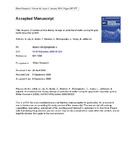JavaScript is disabled for your browser. Some features of this site may not work without it.
| dc.contributor.author | Liu, S. | - |
| dc.contributor.author | Butler, D. | - |
| dc.contributor.author | Memon, Fayyaz Ali | - |
| dc.contributor.author | Makropoulos, C. | - |
| dc.contributor.author | Avery, L. M. | - |
| dc.contributor.author | Jefferson, Bruce | - |
| dc.date.accessioned | 2011-04-13T23:09:21Z | |
| dc.date.available | 2011-04-13T23:09:21Z | |
| dc.date.issued | 2010-01-01T00:00:00Z | - |
| dc.identifier.citation | S. Liu, D. Butler, F.A. Memon, C. Makropoulos, L. Avery, B. Jefferson, Impacts of residence time during storage on potential of water saving for grey water recycling system, Water Research, Volume 44, Issue 1, January 2010, Pages 267-277 | en_UK |
| dc.identifier.issn | 0043-1354 | - |
| dc.identifier.uri | http://dx.doi.org/10.1016/j.watres.2009.09.023 | - |
| dc.identifier.uri | http://dspace.lib.cranfield.ac.uk/handle/1826/4117 | |
| dc.description.abstract | Grey water recycling has been generally accepted and is about to move into practice in terms of sustainable development. Previous research has revealed the bacteria re-growth in grey water and reclaimed municipal water during storage. However, in most present grey water recycling practices, impacts of water quality changes during storage on the system's performance and design regulation have not been addressed. In this paper, performance of a constructed wetland based grey water recycling system was analysed by taking the constraint of residence time during storage into account using an object based household water cycle model. Two indicators, water saving efficiency (WSE) and residence time index (RTI), are employed to reflect the system's performance and residence time during storage respectively. Results show that WSE and RTI change with storage tank volumes oppositely. As both high WSE and RTI cannot be achieved simultaneously, it is concluded that in order to achieve the most cost-effective and safe solution, systems with both small grey and green tanks are needed, whilst accepting that only relatively modest water saving efficiency targets can be achieved. Higher efficiencies will only be practicable if water quality deterioration in the green water tank can be prevented by some means (e.g. disinfection). | en_UK |
| dc.language.iso | en_UK | en_UK |
| dc.publisher | Elsevier Science B.V., Amsterdam. | en_UK |
| dc.subject | Grey water recycling | en_UK |
| dc.subject | Residence time | en_UK |
| dc.subject | Storage tank | en_UK |
| dc.subject | Water quality degradation | en_UK |
| dc.subject | Water saving | en_UK |
| dc.title | Impacts of residence time during storage on potential of water saving for grey water recycling system | en_UK |
| dc.type | Article | en_UK |
Files in this item
This item appears in the following Collection(s)
-
Staff publications (SAS) [907]
